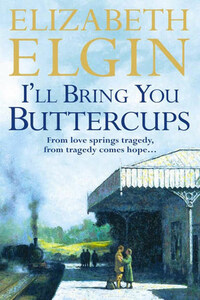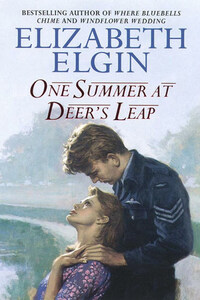Two hats. A leghorn straw and a warm winter felt, belonging to a faraway, mist-wrapped happiness. They were all she would keep of her mother; all that mattered. Meg closed her eyes and clamped her jaws tightly against tears. Yesterday she had wept, raged against the Fates for the very last time. Today she arranged her mother’s clothes into two piles: one to be discarded, the other to be given to the deserving – except the hats, of course.
She picked them up, spinning one on each forefinger, liking them because Ma had worn them year in, year out; disliking them because they were the badge of her poverty, given in charity. Dolly Blundell would not wear them again. She had laundered her last sheet, ironed her last starched shirt, washed and laid out her last corpse. Ma had gone to a heaven called Candlefold, where all happiness was and is and would be, and only someone selfish as herself, Meg thought sniffily, would want to call her back to Tippet’s Yard.
She slid her eyes to the clothes on the tabletop. Not much to show for over forty years of living, and they could go as soon as maybe. All Meg wanted was the hats, and Ma’s nine-carat gold wedding ring that hung now on the chain around her neck. Funny about that ring, when there was no man in Ma’s life; never had been.
Of course, there must have been really. If only for a brief coupling there had been a man, though who he was and where he was Meg would never know now. He’d never even had a name, which was sad. Bill Blundell was he called, or Richie or Ted – and had he been a seaman, a scholar or a scallywag?
Ma had never let herself be drawn to speak one word about him, good or bad. Nor had Nell Shaw been of any help. If Nell knew anything, she too had been stoically silent and had Meg not discovered at an early age how babies were got, she could have been forgiven for thinking Ma had found her on the doorstep of 1 Tippet’s Yard, and taken her in and worked like a slave to keep her fed and clothed.
‘Come in, Nell,’ she called, when the door knocker slammed down. But it couldn’t be her neighbour, because Nell always walked in uninvited. ‘That you, Tommy?’ Meg squinted through the inch-open door.
‘No it isn’t, and let me in, girl, or you’ll not get the pressies I’ve brought you!’
‘Kip! Kip Lewis, am I glad to see you!’ She nodded towards the table. ‘I was trying not to whinge, see. But sit yourself down and I’ll make us a brew. And leave the door open, let a bit of air in!’
And let all the misery out, and Ma’s unhappiness and that constant, frail cough. Let Dolly Blundell go to her Candlefold and be happy again.
‘Sorry about your mother,’ he said gently. ‘Amy told me. I knew she wasn’t all that good, but I hadn’t expected – well – not just yet …’
‘Nor me, Kip. It came quick, at the end. Looking back on things she’d said, I think she’d had enough. I found her there one morning early, sitting against the lavvy wall, arms round her knees; must’ve been there for hours. You might have thought she was asleep, but I knew straight away she was dead – it had been a bitterly cold night. Promise you won’t say anything to your Amy, but I think she meant to do it. She’d got that she couldn’t work, because of the coughing. She was just getting thinner and weaker, so in the end I sent for the doctor.’
She set the kettle to boil, closing her eyes tightly, determined there would be no more tears.
‘Ma wasn’t best pleased; said doctors cost money and, anyway, there was no cure for what she’d got. But the one who came was very decent; said he’d get her into a sanatorium in North Wales; told her there was a charity ward for people like her, without means. Said he could have her in, within a week …’
‘She had TB?’
‘Yes. I think she always knew it. Mind, she had a decent funeral. Always kept her burial club going, no matter what. Said she wasn’t letting the parish give her a pauper’s funeral. God! She was so cussed proud, even at the end!’
‘Don’t get upset, Meg. You did your best.’
‘I did what I could, once I was working. And I think she’d have gone into that sanatorium if the doctor hadn’t mentioned charity. There was something about her, Kip; a sort of – of – gentility. Even Nell noticed it. Maybe it was because she’d been in service, you see; housemaid to the gentry.’
‘She was different, I’ll grant you that. Amy said she always kept herself to herself.’
‘Which wasn’t hard in a dump like this.’
Apart from the entry and a sign to the left of it marked ‘Tippet’s Yard’, you could pass by and never know it was there.
‘It isn’t such a bad little place, Meg.’ He wanted to take her in his arms and kiss her breathless, but he held back, sensing her need to talk. He loved her, did she but know it, though he’d never dared say so; never gone beyond hugs and goodnight kisses.














